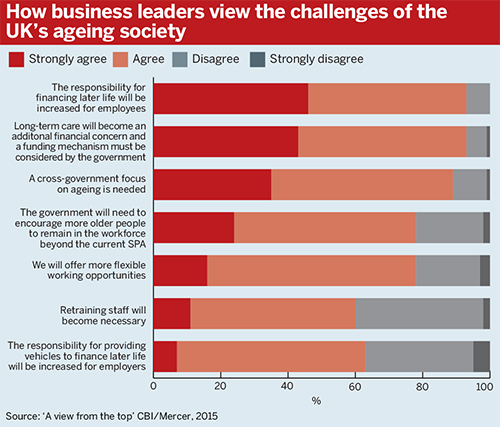Data Analysis: UK employers are waking up to the reality of increasing longevity but government, the pensions industry and individuals need to redouble their efforts in order to combat the financial risks it poses.
In 2065 one in four people in England and Wales will be able to catch a bus for free – as long as bus passes for the over-65s survive until then.
According to Office for Budget Responsibility forecasts, over the next 50 years the proportion of the population aged over 65 will rise from 18 per cent to more than a quarter of the total population.
The views of chief executives and board directors from 166 companies across the UK, compiled by the Confederation of British Industry and consultancy Mercer, show that UK employers are starting to sit up and take stock of what increasing longevity will mean for UK plc.

UK executives contributing to the report identified the need for responsive action to be taken by employees, employers and the government.
The role of government
The provision of long-term healthcare and creation of an appropriate funding mechanism was a major priority for chief executives; 92 per cent said healthcare will become an additional strain.
Nine in 10 business leaders (89 per cent) said the government needs to develop a comprehensive strategy to prepare for an ageing society.
Latest data from the Office for National Statistics show the number of people aged 75 and over has increased by 89 per cent since 1974 and now makes up 8 per cent of the population.
Speaking at the National Association of Pension Funds’ annual conference last month, Carol Jagger, Axa professor of Epidemiology of Ageing at Newcastle University, said declining health in later life, regional inequalities for healthy life expectancy and the rising proportion of over-85s in the population were particularly concerning for both employers and employees as working life extends deeper into old age.
The longevity challenge: 5 key principles
AdequacyMore must be done to help people understand and define an adequate income and how that will impact them on an individual level.
InformationA 'common information' template is required to serve as a consistent basis for retirement planning initiatives.Government service Pension Wise provides such a framework in the UK but fewer than 20,000 of the 200,000 people who accessed their pension pot between April-June 2015 completed face-to-face and telephone appointments, according to a report from the Work and Pension Select Committee published earlier this month.
FlexibilityA flexible regulatory framework should also support innovation, balancing policy objectives with the cost of compliance. Products must offer practical, cost-efficient outcomes.
EquityThe allocation of tax relief around retirement income and the distribution of benefit and cost across generations will challenge easy definitions of equity and concepts of fairness.
SustainabilityChanges to the retirement income market should enable the development of a long-term sustainable market. Sustainability also requires the development of an equitable intergenerational system; further changes are inevitable if an unsustainable burden is placed on any one generation of taxpayers.
Source: IFoA
According to Jagger, cognitive life expectancy has increased over the past 20 years but the longer-term outlook for living to an old age free of disability is bleak, and subject to extreme regional inequalities.
But the CBI/Mercer report shows UK business leaders are responding to the demographic shift.
Nearly four-fifths of company chiefs (78 per cent) will offer more flexible working opportunities to support older workers during the later stages of their career, while 60 per cent recognise the need to do more to maintain and improve employee skills if older people are to remain fully effective in the workplace.
Making savings last a lifetime
Long-term savings will be a crucial piece in the ageing puzzle.
Increasing longevity is one factor behind the skyrocketing liabilities of UK defined benefit funds that have driven an exodus into defined contribution arrangements over the past 15 years or so.
The transfer of responsibility for managing longevity, investment and inflation risk onto the individual puts increasing pressure on their financial decisions.
A recent report from the Institute and Faculty of Actuaries, 'Making Retirement Income Last a Lifetime', identifies individuals’ choice to save an adequate amount for retirement as “critical” in a lifetime of financial decisions.
Assessing DC developments in the UK, Australia and the US, the report said there is “recognition by respective legislators that it is important to encourage people to save for a pension and make choices at retirement that lead to a sustainable income”.
Products offering an income guarantee, or decumulation with reasonable assurance that the individual will not outlive their assets, will be crucial to safeguard people though a longer life. But the IFoA said many individuals simply will not understand longevity risk or consider its implications when they come to plan their retirement income.

















